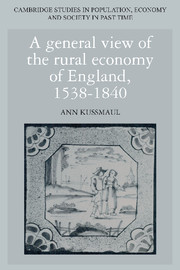Book contents
- Frontmatter
- Contents
- List of figures
- List of tables
- Preface
- 1 A bird's eye view of the past
- 2 ‘When shall we marry?’
- 3 Source and method
- 4 Agrarian change: the evidence
- 5 Regional specialization, causes and consequences
- 6 Rural manufacturing, location and labour
- 7 Change, consolidation, and population
- 8 What the view saw
- Appendix Parishes: representation and Seasonal Types, by county
- Bibliography
- Index
5 - Regional specialization, causes and consequences
Published online by Cambridge University Press: 08 October 2009
- Frontmatter
- Contents
- List of figures
- List of tables
- Preface
- 1 A bird's eye view of the past
- 2 ‘When shall we marry?’
- 3 Source and method
- 4 Agrarian change: the evidence
- 5 Regional specialization, causes and consequences
- 6 Rural manufacturing, location and labour
- 7 Change, consolidation, and population
- 8 What the view saw
- Appendix Parishes: representation and Seasonal Types, by county
- Bibliography
- Index
Summary
An interpretive problem arises in the search for causes of the regional agricultural divergence. High autumn indices of marriages are ambivalent. They could have resulted from high employment in grain production for integrated markets and extralocal consumption, or from a lack of market integration between places, necessitating the subsistence production of grain. Parishes might have been producing grain, no matter what other additional employments were practised, because grain, the main foodstuff, was not being obtained from more distant suppliers. They would have been ‘bound and localized’ economies, with grain as the subsistence crop. Low autumn seasonality, in contrast, is prima facie evidence for market orientation; it can only mean that the area is dependent on interregional trade for its supply of breadstuffs. The observed shift away from autumn seasonality in some regions, and its retention in others, is therefore subject to multiple constructions, not always mutually exclusive:
thoroughly integrated regions could have been readjusting their market-oriented specializations in response to changes in relative prices; or
regions could have been becoming better integrated into supraregional or international markets, dropping their dependence on local grain supplies; or
households in areas less suited to growing grain could have been becoming better integrated into market production, dropping the subsistence output of grain in favour of other products, Tawney's peasantry yielding to capitalist agriculture.
- Type
- Chapter
- Information
- A General View of the Rural Economy of England, 1538–1840 , pp. 103 - 125Publisher: Cambridge University PressPrint publication year: 1990



